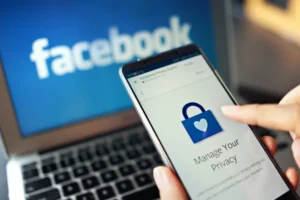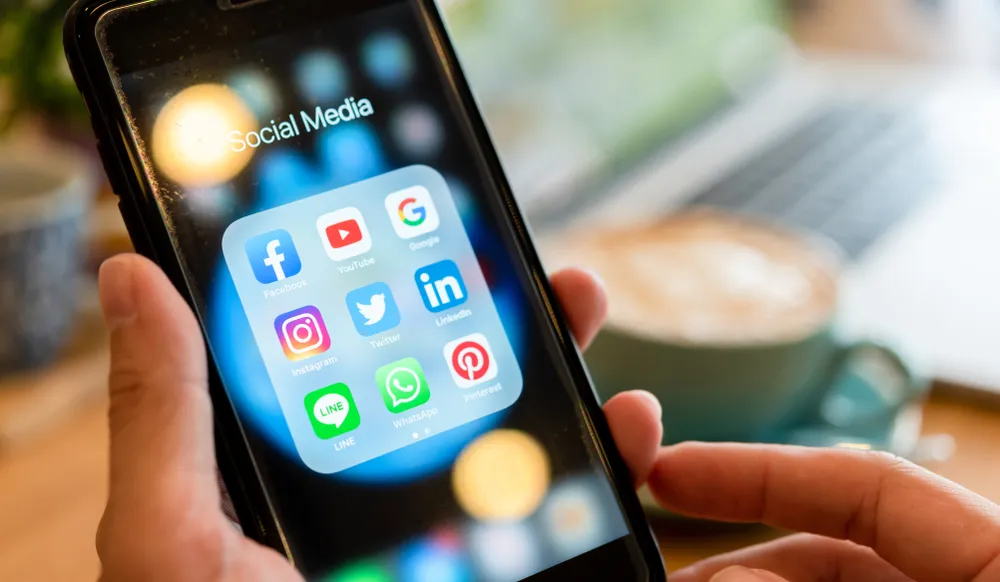Social media is now a crucial component of contemporary communication and information sharing. However, it also has a number of drawbacks of its own. The main drawback is addiction. Social media addiction can result in decreased productivity, a lack of participation in activities in the real world, and even mental health problems. Another significant drawback of social media is cyberbullying, which gives people an anonymous forum to harass and bully others. Other potential drawbacks of using social media include privacy issues, issues with comparison and self-esteem, the dissemination of false information, distraction, sleep disturbances, a decline in social skills, and a detrimental effect on mental health. It’s critical to be aware of these drawbacks and utilise Disadvantages of social media responsibly.
-
Harmful Effects on Mental Health

Social media now plays a crucial role in our daily lives by allowing us to communicate with loved ones, spread knowledge, and amuse ourselves. Recognising any potential drawbacks to its use is also crucial, though. disadvantages of social media detrimental effects on mental health are among its key drawbacks.
Addiction is one way that social media has an impact on mental health. Because social media platforms are made to keep users interested, productivity often suffers and participation in offline activities declines. A sense of anxiety and addiction can develop from the incessant urge to check messages and updates, which can result in stress and burnout. Additionally, the pressure to maintain a perfect online persona can lead to unrealistic expectations.
Social networking also causes anxiety and despair, which is a drawback. Feelings of inadequacy and low self-esteem can result from the pressure to maintain an ideal image and follow online trends. Feelings of hopelessness and anxiety can also be exacerbated by a frequent exposure to unfavourable news and events that are posted on social media.
Last but not least, cyberbullying, a serious issue that can negatively affect a person’s mental health, has flourished on social media. Social media’s anonymity and distance can make it simpler for people to harass and bully others, which can result in feelings of guilt, loneliness, and melancholy.
In conclusion, while social media has its positives, it’s critical to be aware of and take steps to mitigate any risks it may offer to one’s mental health. Cyberbullying, addiction, and anxiety and sadness are just a few instances of the harmful effects that social media may have. To prevent and reduce the detrimental effects of social media on mental health, it is crucial to exercise moderation, take care of oneself, and spread awareness about online safety.
-
Harmful Effects on Physical Health

Although social media has many advantages, it is important to be aware of the risks it may pose to physical health. Social media has become an essential part of our daily lives. In this essay, we’ll talk about the negative effects of social media on physical health, with a particular emphasis on obesity, sluggish sleeping patterns, eye strain, and headaches.
Social media and obesity are both related. Social media use frequently involves prolonged durations of sitting in front of screens due to its sedentary nature. This may result in a drop in physical activity and, thus, a higher risk of obesity. Furthermore, unhealthy food advertisements are frequently posted on social media platforms, which can encourage bad eating practises and raise the risk of obesity.
Social media and bad sleeping habits can also impair our sleep patterns. Our bodies’ natural sleep cycle can be disturbed by the blue light emitted by screens, making it difficult to fall asleep and resulting in poor quality sleep. In addition, the constant need to check social media might keep people up late and prevent them from getting enough sleep.
-
Security and Privacy Issues

We now rely heavily on social media platforms to interact with people around the world and share our lives with them. But as social media usage grows, serious privacy concerns have emerged. The privacy issues relating to social media, such as data breaches, identity theft, and cyberstalking, will be covered in this essay.
Personal information leakage is one of the biggest privacy issues relating to social media. Numerous social media sites gather and save the personal data of users, including their name, birthdate, email address, and phone number. Users’ sensitive information may be revealed to the public if this data is susceptible to cyberattacks and data breaches.
Another issue with privacy on disadvantages of social media is identity theft. Cybercriminals can impersonate people, gain access to their accounts, or even steal their identities by using personal information collected via social media. Social media posts can potentially be used to access other accounts or private data by providing answers to security questions.
Last but not least, cyberstalking on disadvantages of social media is an increasing issue. Social media’s anonymity can make it easier for stalkers to find and harass people online, instilling feelings of fear and insecurity. Stalkers may find it simpler to figure out someone’s routines, whereabouts, and personal information due to constant access to their private life being posted on social media.
Conclusion: Despite the advantages of social media, it is important to recognise and handle any privacy issues that can arise from its use. Cyberstalking, identity theft, and personal information leaking are just a few instances of how social media can compromise privacy. When sharing personal information online, exercise caution, regularly check and update privacy settings, and awareness to prevent and minimize the potential negative effects of social media on privacy.
-
Wasting Time

Social media has permeated every part of our lives, and while it has numerous advantages, it also presents serious drawbacks, such as time wastage. The negative effects of social media on time management and productivity, including distraction, time-consuming activities, and a deluge of information, will be covered in this essay.
The possibility for distraction is one of social media’s biggest negatives. The addicting nature of social media platforms makes it simple for users to lose track of time when reading through their feeds or interacting with other users. As a result, people may become less productive because they spend more time on social media than on important duties.
The variety of time-consuming activities available on social media is another facet of time-wasting related to it. Numerous features on social media platforms, such as chat rooms, news feeds, and games, can easily squander users’ time. While these activities can be enjoyable, they also consume time that could be used for tasks that are more productive.
Last but not least, the deluge of information that can be found on social media can be a time-wasting issue. Users find it difficult to keep up with the rapid flood of new information that social media sites display. As a result, people may spend more time than required using social media in an effort to stay current with news and updates.
-
Dissemination of false information and news

One major drawback of social media is the proliferation of false information and fake news. With billions of users across numerous social media platforms, it has gotten a lot simpler for individuals and organisations to spread rumours and conspiracies. In this essay, we’ll talk about the detrimental effects of social media on the dissemination of false information, including how it amplifies rumours and conspiracy theories, fuels conflict and polarisation, and undermines the credibility of reputable sources.
The spread of rumours and conspiracy theories on social media is one of the biggest issues with it. Social media platforms give people and organisations a simple tool to spread incorrect information and quickly reach a big audience. This can cause rumours and conspiracy theories to spread quickly and are challenging to disprove once they are in the public eye.
The fact that disadvantages of social media polarises and divides people has a detrimental effect on the propagation of false information as well. Social media algorithms are made to only present users with information that supports their values and worldviews, which can cause people to become more and more alienated from those who have different perspectives. As a result, people may distribute erroneous information and conspiracy theories more widely.
Last but not least, the dissemination of false information and fake news may cause people to lose faith in trustworthy sources of information. People may find it challenging to distinguish between accurate and incorrect information due to the volume of false material that is published on social media. As a result, people may start depending on less trustworthy information sources and their trust in established news sources may decline.
In conclusion, the proliferation of false information and fake news is a big drawback of social media, with the amplifying of rumours and conspiracy theories, polarisation and division, and loss of faith in reputable sources being only a few of the difficulties associated with its use. To counteract the detrimental impacts of social media on the dissemination of false information, it is vital for individuals to be sceptical of the material they encounter on social media and look for trustworthy sources of information.
-
Affecting relationships negatively

Disadvantages of social media on relationships is a growing concern in contemporary society. While social media has made it simpler to connect with people around the world, it has also reduced in-person interaction, increased reliance on virtual connections, and heightened feelings of FOMO (fear of missing out). In this essay, we’ll talk about how social media can harm relationships by reducing in-person interaction, encouraging an overreliance on online connections, and creating FOMO.
The decline in face-to-face engagement is one of the most important ways social media has a bad impact on relationships. Social networking sites make it simple to interact with others, but this can result in people spending more time online than in person. This may result in a loss of closeness and emotional connection, which could be detrimental to relationships.
The over-reliance on virtual connections has a negative effect on relationships as well. Social media platforms enable people to communicate with people all over the world, but this could result in an unhealthy reliance on online relationships. As a result, people may feel more attached to their virtual connections than to their real-world interactions, which may make them feel isolated and lonely.
Finally, FOMO, or the fear of missing out, can be detrimental to relationships. Social networking sites have the potential to foster a sense of rivalry and comparison, which may make users feel as though they are losing out on experiences that others are enjoying. As a result, people can become unsatisfied with their current relationships and look for new online partnerships, which would further distance them from their real-life relationships.
In conclusion, there is growing concern about social media’s detrimental effects on relationships. A few of the issues with its use include the decline in in-person communication, an overreliance on virtual connections, and the fear of missing out. Individuals must be conscious of these detrimental effects and take action to balance their online and offline relationships to maintain healthy relationships in both worlds.
Conclusion
In conclusion, disadvantages of social media has a lot of positives but also a lot of drawbacks that can hurt people and society as a whole. These drawbacks include of detrimental effects on relationships, privacy problems, time waste, the dissemination of false information, and detrimental effects on mental and physical health. Individuals and society should take seriously the detrimental effects on mental and physical health, such as addiction, anxiety, depression, obesity, poor sleeping patterns, eye strain, and headaches. Additionally, privacy issues like identity theft, personal information leaks, and cyberstalking can cause enormous harm. The potential of social media to disseminate false information and fake news can also divide society and cause people to lose faith in trustworthy sources. Last but not least, social media can harm relationships by reducing in-person interaction, encouraging an overreliance on virtual connections, and inducing FOMO. People must therefore be aware of these negative effects of social media and take the necessary precautions to lessen them, such as restricting their usage and carefully curating their online profile.
FAQs
- Is there such a thing as social media addiction?
Addiction to social media is a valid issue that is becoming worse. A lot of people find themselves wasting too much time on social media sites, which may be detrimental to their relationships, mental health, and ability to get things done at work.
- Can social media have a negative impact on mental health?
It is true that using social media excessively can harm our mental health, including depression and anxiety.
- How can I safeguard my online privacy?
By making your account private, being selective with the information you publish, and using secure passwords, you can preserve your privacy on social media.
- How can cyberbullying be stopped?
People must be made aware of the negative effects of bullying and encouraged to speak out against it in order to counteract cyberbullying. The use of tools and policies by social media platforms can assist stop and solve cyberbullying.
5.Are social networking sites a trustworthy source of news?
Although social media can be a source of information, you should always double-check the accuracy of any information you find there before taking it at face value. Additionally, fake news and misinformation can thrive on social media.


